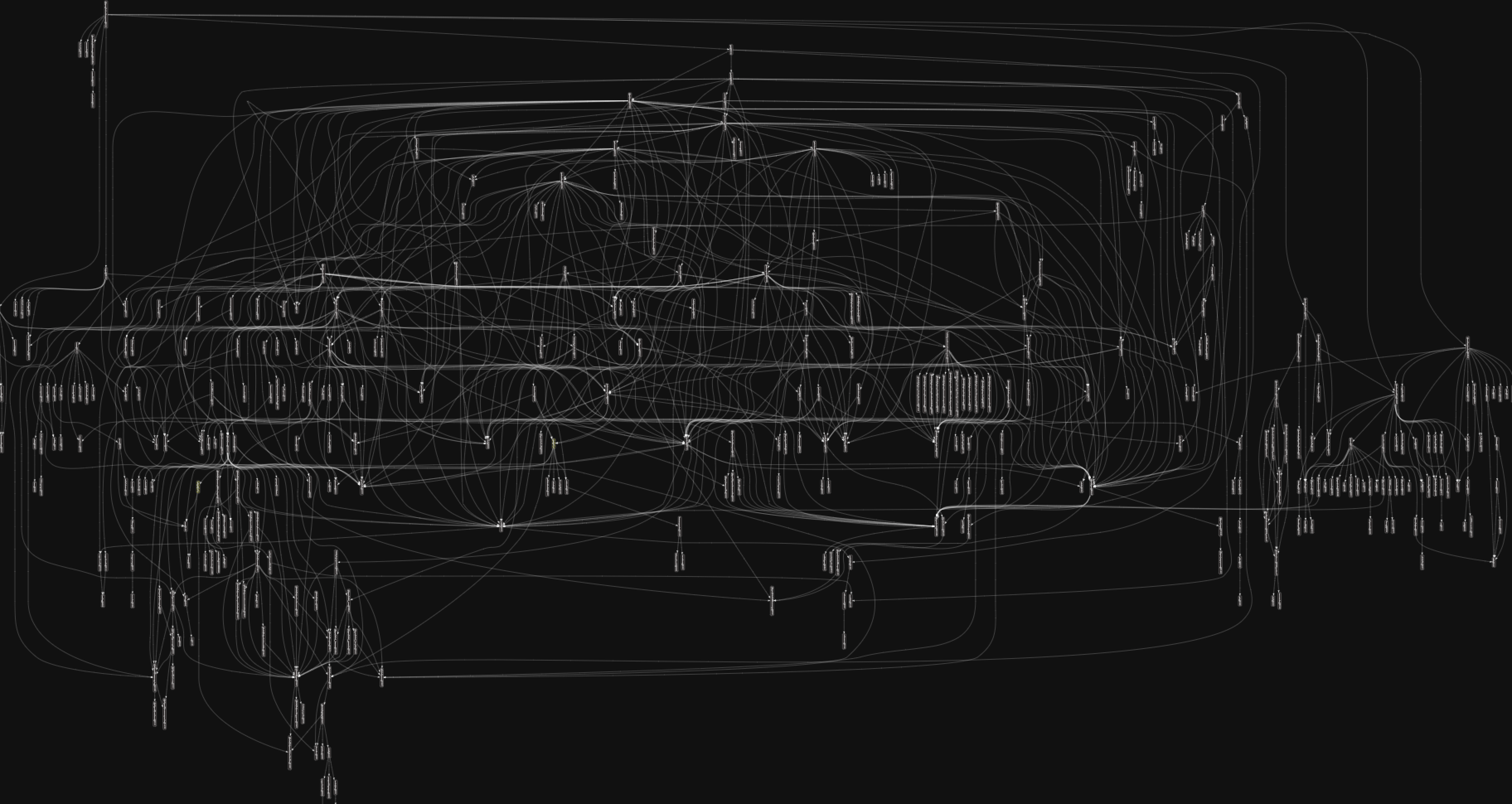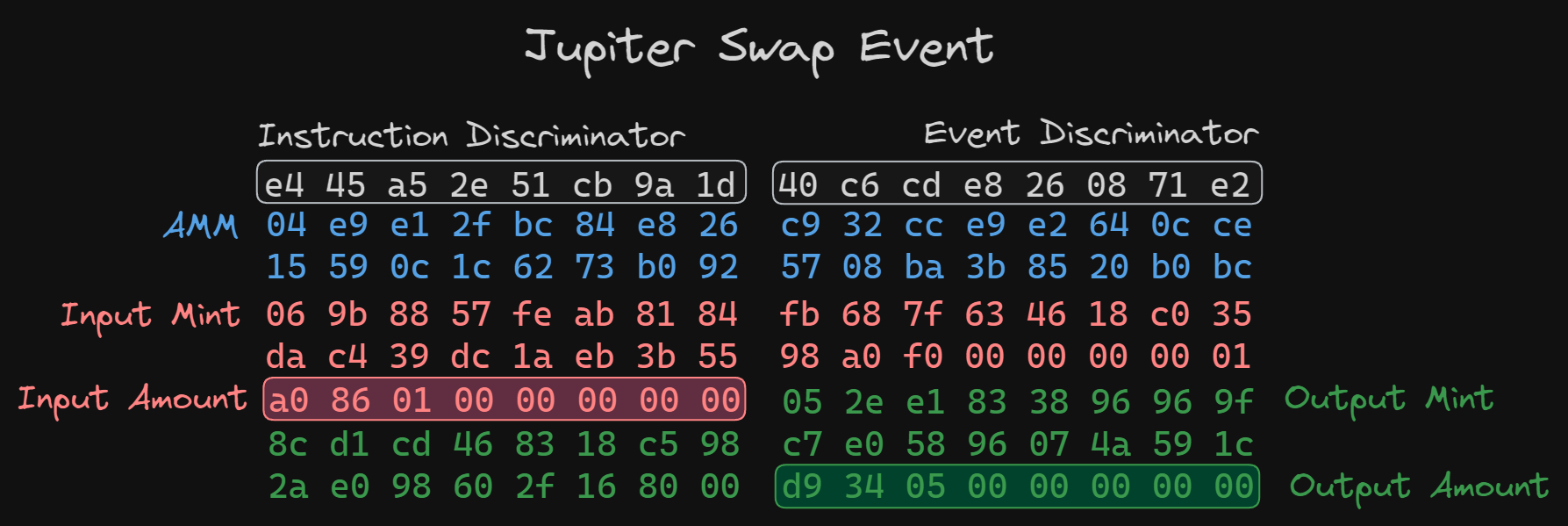Decode Solana Transactions on a budget
Check out the follow up post on doing this with web3js 2.0.
Creating a 45x smaller minimal library to decode Solana transactions in javascript.
Background
Technologies used by Solana
- Anchor is a framework for Solana smart contracts, IDL specification.
- Solana serializes data using BORSH - Binary Object Representation Serializer for Hashing
Use case: On the frontend we want to parse Jupiter Swap Events, you can see this when viewing a transaction on Solscan.
const tx = getTransaction(txHash)const swaps = parseTxSwaps(tx) // Imaginary function[ { amm: "LBUZKhRxPF3XUpBCjp4YzTKgLccjZhTSDM9YuVaPwxo", inputMint: "MEW1gQWJ3nEXg2qgERiKu7FAFj79PHvQVREQUzScPP5", inputAmount: 341209n, outputMint: "EPjFWdd5AufqSSqeM2qN1xzybapC8G4wEGGkZwyTDt1v", outputAmount: 14667n, }]fEven using getParsedTransaction from web3.js you will notice that the data is in its raw, base58 encoded form.
rpc.getParsedTransaction(txHash)// Jupiter{ "accounts": ["D8cy77BBepLMngZx6ZukaTff5hCt1HrWyKk3Hnd9oitf"], "data": "QMqFu4fYGGeUEysFnenhAvBobXTzswhLdvQq6s8axxcbKUPRksm2543pJNNNHVd1VJ58FCg7NVh9cMuPYiMKNyfUpUXSDci9arMkqVwgC1zp94XrEkgEX68QGBNbfpkzGSTG2i4ReApCRe6qocBT275xZsK54Z8h8GxZS4WWsSd6AvK", "programId": "JUP6LkbZbjS1jKKwapdHNy74zcZ3tLUZoi5QNyVTaV4", "stackHeight": 2},// Some programs, such as SPL are decoded{ "parsed": { "info": { "authority": "HLujcj6D7kdH3gLktJRXB95vRbfhp558HvsFoSLMKaSZ", "destination": "AhR2gTxbKpouGEzTJ86Cki2z2qSDe9p7to8jxYCAWsfZ", "mint": "MEW1gQWJ3nEXg2qgERiKu7FAFj79PHvQVREQUzScPP5", "source": "CGb9s5dyTqJuXRKwJkvWmVkLPzy3B9iYYksdn2Q7nGLb", "tokenAmount": { "amount": "341209", "decimals": 5, "uiAmount": 3.41209, "uiAmountString": "3.41209" } }, "type": "transferChecked" }, "program": "spl-token", "programId": "TokenkegQfeZyiNwAJbNbGKPFXCWuBvf9Ss623VQ5DA", "stackHeight": 3},Typescript Ecosystem
Conveniently Jupiter provides a package to parse events.
import { extract } from "@jup-ag/instruction-parser";extract(tx);The cost

The dependency graph is huge.
Specifically for parsing these are the main dependencies.
@jup-ag/instruction-parser → @coral-xyz/anchor → @coral-xyz/borsh → buffer-layout
We could go down a layer and use @coral-xyz/anchor, which allows you to use an IDL to parse, but it is still large.
Issues
- Large bundle size - 618 kB -> 187 kB (gzip). Dependencies have no ESM support
- Uses many deps - bn.js (native
BigIntexists), bs58 (modern equivalent@scure/base) - Usage of Buffer - Technically
web3.jshas it anyway, but its removed in the ongoing rewrite - Class based - Non-optimal tree shaking, the class has additional code such as instruction parsing that can’t be tree-shaken away.
- Have to include entire IDL - Jupiter’s IDL is 18kb and don’t forget the IDL parser itself. Feature or overhead?
Minimal parser for Swap Events
Our scope is limited, we only need to decode and for 1 type of event, Jupiter’s Swap event. With this lets figure out the minimal steps required.
- Get data for swap transaction
2a4EpB...
const tx = await getTransaction("2a4EpB...")tx.meta.innerInstructions.forEach(ix => {...})We filter out Jupiter Program ID JUP6Lkb... instruction data
ix { accounts: [ 'D8cy77BBepLMngZx6ZukaTff5hCt1HrWyKk3Hnd9oitf' ], data: 'QMqFu4fYGGeUEysFnenhAvBobXTzswhLdvQq6s8axxcbKUPRksm2543pJNNNHVd1VJ58FCg7NVh9cMuPYiMKNyfUpUXSDci9arMkqVwgC1zp94XrEkgEX68QGBNbfpkzGSTG2i4ReApCRe6qocBT275xZsK54Z8h8GxZS4WWsSd6AvK', programId: 'JUP6LkbZbjS1jKKwapdHNy74zcZ3tLUZoi5QNyVTaV4', stackHeight: 2}ix { accounts: [ 'D8cy77BBepLMngZx6ZukaTff5hCt1HrWyKk3Hnd9oitf' ], data: 'QMqFu4fYGGeUEysFnenhAvBobXTzswhLdvQq6s8axxcbKUPRksm2543pJNNNHVd1VJ4E2hRWa3GsBQPU2sRp3sRtjPENk4z91Q3X1PbK516ePc2y6ByX88EtCjDWkqotkzT2RmM7oWpZpVXPJqk9N7YoG7hjSjejznGCKmaoH7u68dM', programId: 'JUP6LkbZbjS1jKKwapdHNy74zcZ3tLUZoi5QNyVTaV4', stackHeight: 2}ix { accounts: [ 'D8cy77BBepLMngZx6ZukaTff5hCt1HrWyKk3Hnd9oitf' ], data: 'QMqFu4fYGGeUEysFnenhAvDWgqp1W7DbrMv3z8JcyrP4Bu3Yyyj7irLW76wEzMiFqkMXcsUXJG1WLwjdCWzNTL6957kdfWSD7SPFG2av5YHKd5MazCGSGzUpJNtxRdjzMQ124wR1QyZj2zDKLPDXmi2Q4WgHVPnzBgFHQNvvw93wLk7', programId: 'JUP6LkbZbjS1jKKwapdHNy74zcZ3tLUZoi5QNyVTaV4', stackHeight: 2}- Decode from base58
const ixData = base58.decode(ix.data);On Solscan the Instruction Data Raw is displayed in hex by default, doing that will make it easier for us to visualise the binary structure.
base16.encode(ixData).toLowerCase()
// Hexe4 45 a5 2e 51 cb 9a 1d 40 c6 cd e8 26 08 71 e204 e9 e1 2f bc 84 e8 26 c9 32 cc e9 e2 64 0c ce15 59 0c 1c 62 73 b0 92 57 08 ba 3b 85 20 b0 bc06 9b 88 57 fe ab 81 84 fb 68 7f 63 46 18 c0 35da c4 39 dc 1a eb 3b 55 98 a0 f0 00 00 00 00 01a0 86 01 00 00 00 00 00 05 2e e1 83 38 96 96 9f8c d1 cd 46 83 18 c5 98 c7 e0 58 96 07 4a 59 1c2a e0 98 60 2f 16 80 00 d9 34 05 00 00 00 00 00- The first 8 bytes is the instruction discriminator, an identifier. We can skip this as we only care are about the Swap Events emitted (source)
// Skip// e4 45 a5 2e 51 cb 9a 1d : `global:${instruction_name}` e.g. `global:swap`const eventData = ixData.subarray(8);- This leaves us with event data. Firstly, we need to determine the event type to deserialize as there may be multiple possible events.
.. .. .. .. .. .. .. .. 40 c6 cd e8 26 08 71 e204 e9 e1 2f bc 84 e8 26 c9 32 cc e9 e2 64 0c ce15 59 0c 1c 62 73 b0 92 57 08 ba 3b 85 20 b0 bc06 9b 88 57 fe ab 81 84 fb 68 7f 63 46 18 c0 35da c4 39 dc 1a eb 3b 55 98 a0 f0 00 00 00 00 01a0 86 01 00 00 00 00 00 05 2e e1 83 38 96 96 9f8c d1 cd 46 83 18 c5 98 c7 e0 58 96 07 4a 59 1c2a e0 98 60 2f 16 80 00 d9 34 05 00 00 00 00 00To identify events, there is an event discriminator in the first 8 bytes.
This comprises of the first 8 bytes from the sha256 hash of the event signature. The signature is event:${event_name} (source). You can try this out on CyberChef.
// namespace = "event"// event name from IDL = "SwapEvent"const signature = `${namespace}:${name}`;
// 40 c6 cd e8 26 08 71 e2sha256(signature).subarray(0, 8);Now we can identify Swap Events and deserialize with the appropriate struct.
- Deserializing the data
From Jupiter’s Program IDL we can determine the struct. The struct is quite simple. No need for an IDL parser, we can declare this in code directly.
"events": [ { "name": "SwapEvent", "fields": [ { "name": "amm", "type": "publicKey", "index": false }, { "name": "inputMint", "type": "publicKey", "index": false }, { "name": "inputAmount", "type": "u64", "index": false }, { "name": "outputMint", "type": "publicKey", "index": false }, { "name": "outputAmount", "type": "u64", "index": false } ] }],
With this struct in mind, we can write deserializers for the specific data types and combine them to parse the event based off the structure.
We can use modern javascript functionality to do this without bringing in large dependencies.
Update 19 Oct. Web3js v2 has landed and exports decoders that we can use. I highly recommend you use that instead.
- Deserialize public key - 32 bytes types
- Deserialize little endian uint64- 8 bytes type
Combining both, we can now succesfully deserialize Swap Event with only minimal code and dependencies.
Comparisons
The impact of this is significant.
@jup-ag/instruction-parser- Bundle size is 618 kB -> 187 kB (gzip) | bundlejs@coral-xyz/anchor- Bundle size is 426 kB -> 124 kB (gzip) | bundlejs- Custom binary decoder - Bundle size is 7.82 kB -> 3.48 kB (gzip) | bundlejs
- 92% of which is libraries for base conversions and hashing
@scure/base@noble/hashes
- 92% of which is libraries for base conversions and hashing
Notable mentions
These are good references, which were useful for de/serialization implementations
- Using
@dao-xyz/borshto decode | bundlejs | Bundle size is 17.8 kB -> 6.3 kB (gzip)- Uses decorators, which might not work with certain builds and I’m not a fan
- An official
borsh-tsrewrite exists, but it’s not published on npm- Addresses some issues, but still class based
@hackbg/borshestlooks good, unsure about the API
Conclusion
Unsure if we will run into issues with more complex data types or scenarios. I made an experimental library AnchorES with a simple API and an easy way to extend or provide new structs to decode. The struct declaration is inspired by validation libraries.